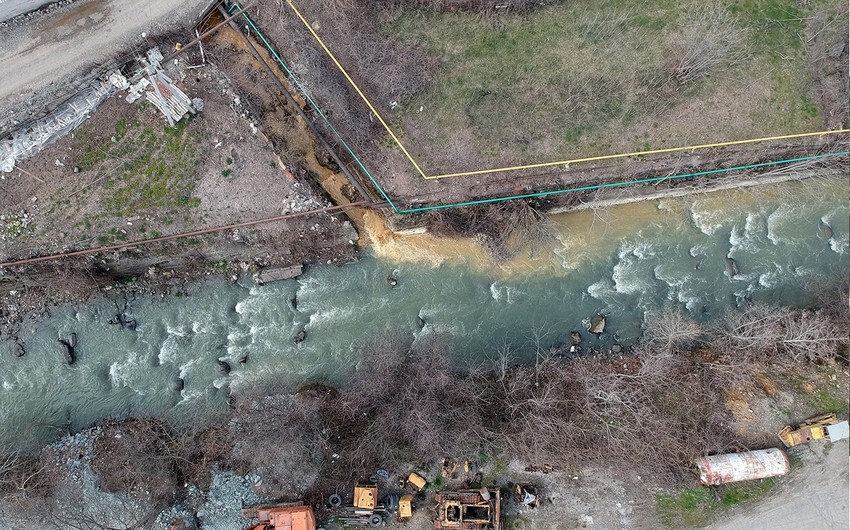The Azerbaijani government is set to sue a German company for its mining activities that have led to catastrophic contamination of the Okhchu River in the country’s Karabakh region.
Farid Shafiyev, Chairman of the Baku-based Center of Analysis of International Relations, said the company operated the Zangazur copper-molybdenum plant in Armenia, which is located at the Okhchu River’s basin, and the work of this plant exposed the river to an environmental disaster.
He added that a lawsuit will be filed against the German company in an international court.
“In Europe, special attention is paid to corporate responsibility. I have worked in Europe and Germany, and I have witnessed it. [However] when it comes to Azerbaijan, different behavior is demonstrated. Azerbaijan will soon sue the German company in an international court, and you will witness it," Azertag quoted Shafiyev as saying.
The Okhchu River is the left branch of Azerbaijan’s second-largest Araz river on the Azerbaijan-Iran state border. The Okhchu River measures 85 kilometers in length and passes through the Gafan district of Armenia and Azerbaijan’s Zangilan region. The river begins at 3,285 meters above sea level on the Gapijig mountain – the highest point of the Zangazur ridge along the Azerbaijan-Armenia border.
The Okhchu River is one of eleven rivers located in the liberated Karabakh (Garabagh) region of Azerbaijan, which is home to more than 30 percent of the country’s overall drinking water reserves. Illegal occupation of the Karabakh region by Armenia for nearly 30 years since the early 1990s has been accompanied by environmental crimes, including deforestation, illicit trafficking of natural resources, and contamination of water reserves.
Germany’s CRONIMET Company is said to control 60 percent of shares at Armenia’s Zangazur copper-molybdenum plant, which is located at the basin of the Okhchu River. The minerals extracted from the country’s largest Gajaran deposit are processed at this plant. The daily processing capacity of the factory is 24,000 tons of minerals. CRONIMENT entered the Armenian market in 1996, while acquired the stakes at the Zangazur copper-molybdenum plant in 2006. The company’s managing director Gunter Pilarsky is said to have close relations with the Armenian authorities. He has reportedly been appointed in 2006 the honorary consul of Armenia in the German state of Baden-Württemberg for his “contributions to the development of economic friendship between two countries.”
It is believed that Armenian authorities have been deliberately allowing CRONIMENT to pollute the Okhchu River, the water of which is not used in Armenia and flows into Azerbaijan’s agriculturally important Araz River. The analysis of the samples taken from the Okhchu river revealed a big number of life-threatening elements in the water, including copper, molybdenum, manganese, iron, zinc, and chromium. The amount of nickel in the river is 7 times, iron 4 times, and copper-molybdenum 2 times higher than normal, according to the examination results.
The environmental disaster facing the Okhchu River became available for a thorough examination after the Azerbaijani military liberated territories from Armenia’s occupation last year. More than 300 settlements, including five cities, which had been occupied by Armenia since the early 1990s, returned under Azerbaijan’s control as a result of a war that lasted 44 days in the Karabakh region in the autumn of 2020. Azerbaijan restored its sovereignty in three more districts as part of the trilateral statement signed on November 10 by Armenia, Azerbaijan and Russia. The liberation of those lands revealed unprecedented crimes committed by Armenia against the nature and natural reserves of Azerbaijan in almost all districts and cities in the Karabakh region.
The Soyudlu gold deposit in the liberated Kalbajar district is one of the multiple natural reserves of Azerbaijan subjected to illegal mining operations by Armenia. According to data, compiled by Azerbaijan’s Ecology and Natural Resources Ministry, from 1993, when Kalbajar was occupied, to 2020, reserves of the deposit have been exploited by the Armenian, as well as foreign companies, such as First Dynasty Mines from Canada, which was later renamed as Sterlite Gold Limited, and Russian GeoProMining Gold. The latter secured a contract for the deposit’s operation until 2028. In 2019, GeoProMining supplied 1.5 tons of minerals from the Soyudlu deposit to the Ararat processing plant in Armenia. The Russian company generated $78.2 million from the deposit per annum. As of October 2020, the company hired 1,654 people for working at the mineral site.
Shafiyev said the foreign companies which operated at the Soyudlu deposit would be sued in one of the European courts based on their illegal actions during the occupation of the Azerbaijani lands.







 President Aliyev emphasized the critical role of the North-South Transport Corridor in fostering transport cooperation between Azerbaijan and Russi...
President Aliyev emphasized the critical role of the North-South Transport Corridor in fostering transport cooperation between Azerbaijan and Russi...
 Russian Foreign Minister Sergei Lavrov has reasserted that Moscow has no intentions to stop the fighting in Ukraine, even if peace talks commence.
Russian Foreign Minister Sergei Lavrov has reasserted that Moscow has no intentions to stop the fighting in Ukraine, even if peace talks commence.
 Iran has refuted reports of alleged damage to Shimon Peres Negev Nuclear Research Centre located southeast of Dimona, Israel, during the recent air...
Iran has refuted reports of alleged damage to Shimon Peres Negev Nuclear Research Centre located southeast of Dimona, Israel, during the recent air...
 Iran and Pakistan have signed eight cooperation documents in various fields, and agreed to strengthen ties to fight terrorism in the region.
Iran and Pakistan have signed eight cooperation documents in various fields, and agreed to strengthen ties to fight terrorism in the region.



